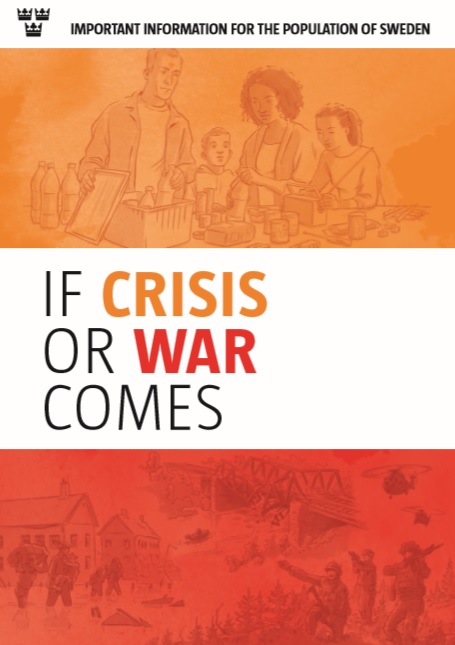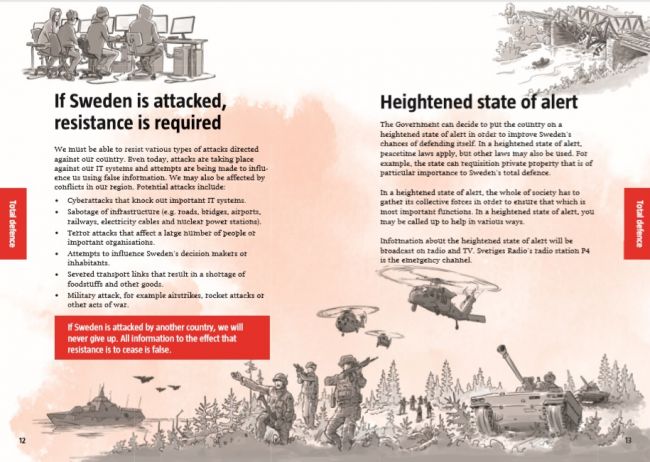The opponents of the Nord Stream 2 have run out of arguments. Unofficial pressure and anti-Russian hysteria are coming to the forefront, not even comparable with the Cold War propaganda. In the European media scene the Baltic gas pipeline issue is now intensifying not even as a threat to the EU energy security, but much easier: after the construction of the Baltic gas pipeline, Russia will invade Ukraine or Sweden. In the Scandinavian country, for example, they even began sending out booklets that tell what Swedes are to do in case of war. Initiators of the information campaigns are obviously not the Europeans. The chronicle of events around the Nord Stream 2 in recent months indicates that it is the US that is trying to create an information background that, in theory, will give some European countries a "reason" to block the Baltic gas pipeline project. If they race against Washington, then the US will have nothing more to do than impose sanctions against European companies that participate in the Baltic project.
Ukrainian "fears"
In April, the Naftogaz of Ukraine management said that the cessation of Russian gas transit via Ukraine would lead to intervention by Russia. "Nord Stream-2" opens a way through Ukraine to the EU for the Russian army," Andriy Kobolyev, the head of the national company's board told Deutsche Welle. "If there is no transit via Ukraine, then the possibility of a full-scale conflict between Russia and Ukraine is also increasing. We convey this idea especially to European politicians who need to assess not only economic consequences for Ukraine, but also geopolitical implications for the whole world," Yuri Vitrenko, commercial director of Naftogaz of Ukraine, said on 112 TV channel. Right behind it, in May, Andriy Kobolyev presented a report on the threats of the Nord Stream 2 at the meeting of the Ukraine-NATO Commission, and the Ukrainian foreign ministry also announced a possible Russian offensive. "And if Nord Stream 2 is built, then we have no guarantees that the conflict will be escalated by Russia, because there is an alternative way of supplying this gas to Europe," Deputy Foreign Minister of Ukraine Olena Zerkal said to Novoye Vremya Radio. At the same time, last week they published an article in the German Frankfurter Allgemeine Zeitung signed by Petro Poroshenko against Nord Stream-2. "Once the Nord Stream 2 is filled with Russian gas flowing outside of Eastern Europe and Ukraine, the Kremlin will not refrain from an even more brutal attack on our common values. Even worse, it will give Russia an advantage," says the article of the Ukrainian president addressed to German readers.
New threats that Ukrainian politicians are trying to frighten Europeans with could be attributed to the hysteria of Kiev, which is not able to stop the Baltic project. However, a similar information campaign is now unfolding in Scandinavia. And it happens, as in the case with Ukraine, after the local politicians communicate with the White House administration representatives.
In March, the head of Naftogaz of Ukraine paid a visit to Washington, where he discussed the situation with Gazprom including with the US Assistant Secretary of State, Wess Mitchell, and Senator Ron Johnson. Just after that, the wave of assumptions about Russian aggression following the construction of the Nord Stream 2 has begun.
While there is no permission: the Swedes are called to be ready for war
German N-TV channel, citing sources, said that during Angela Merkel's visit to Washington, Donald Trump asked the European Union to abandon the Nord Stream 2 in exchange for new agreements on mutual trade. The results of the talks are unknown, but the German chancellor, just at a meeting with the Russian president in Sochi, said that Berlin still sees the Baltic gas pipeline as a commercial project, although she requires the preservation of gas transit through Ukraine. German Minister of Economy and Energy Peter Altmaier clearly stated that even stopping the Baltic gas pipeline project will not mean that Europe will buy LNG from the USA. "If Washington declares that it puts its economic interests first, then it should expect that Europeans will do the same," the minister said.
Thus, Germany continues to resist the US pressure, but there are Sweden and Denmark.
It is only these two countries in Europe who can interfere with the project, whose governments should issue environmental permits for the gas pipeline construction by the summer. Copenhagen and Stockholm have repeatedly stressed that they are against the gas pipeline, but do not see any reason to refuse it. And since last week, since the meeting of Merkel and Putin, even the citizens of these countries were hit by a new information campaign against "Nord Stream-2". First the Deputy Assistant Secretary Sandra Oudkirk said that Russia can install intelligence-related equipment along the Baltic gas pipeline route, and in Naftogaz of Ukraine they reminded through social media sites that Matthias Warnig, the head of the Nord Stream AG board, is a former employee of the Stasi. Following this, US Secretary of State Mike Pompeo called Swedish Foreign Minister Margot Wallström and, as the State Department website said, discussed with her the threat of Nord Stream 2 to the European energy security. The phone call took place on May 17, and on May 21, the Swedish State Agency for Emergency Situations presented "If a crisis or war starts" booklet, which will be sent to all households in the country. In a 20-page booklet, the Swedes are warned that citizens should be prepared for terrorist attacks and even a military invasion. "Many people may feel uncertainty when faced with the realities of our unstable world. And although Sweden is a much safer country than others, there are still threats to our security and independence. Peace, freedom and democracy are the values that we are obliged to protect and strengthen on a daily basis," it says in the introduction.
The document describes the impact of terrorist acts and war at the household level and how Swedish citizens should act, including not to become victims of disinformation. The booklet is a memo, which does not say that the aggressor will be Russia. However, it goes without saying. Moreover, the publication of the booklet coincided not only with the statements of American politicians about the Baltic gas pipeline, but also with the time when Stockholm should issue a permit for the construction of the Nord Stream 2 in the economic zone of Sweden in the Baltic Sea.
Germany and Finland have already issued them. In these countries, the project is unexpectedly challenged by individual environmental organizations that did not previously oppose Nord Stream 1.
Therefore, the fate of the Nord Stream 2 is now in the Danish and Swedish governments hands. Deputy Director of the National Energy Security Fund Alexey Grivach believes that the application of the project is in accordance with the legislation and that Copenhagen and Stockholm have no legal grounds for refusing. Senior analyst at the National Energy Security Fund Igor Yushkov adds that it will be more difficult for Sweden, since they have not accepted a law like in Denmark that allows refusing on national security grounds.
"And Sweden is more important for construction, since the pipeline, albeit with additional costs, can be built around the Danish economic zone, but not Swedish," the expert notes. He assesses the chances of issuing permits as fifty-fifty: "There have been statements about Russia's potential aggression before, but now they are primarily aimed at presenting the project as political. In this case, there is reason to refuse. However, the United States is still far away, and Germany is closer and clearly states that the project is commercial. Therefore, on the one hand, Scandinavian countries can simply follow in the wake of the US information campaign and will therefore issue a permit. On the other hand, it can happen as with the South Stream. Then the European Union slowed down and an American team landed in Bulgaria, which decided everything."
Sanctions - the last "trump card"
According to Igor Yushkov, so far the US is trying to "make others do the dirty work." This may be demonstrated by the Polish attack on the "Nord Stream-2". As EADaily reported earlier, the antimonopoly regulator UOKiK conducted an investigation into the project. In Warsaw they believe that the participants of Nord Stream 2 - Gazprom and five European companies - abandoned the joint venture, but still violated the law, as they reached the same goal using another agreement - financing the construction of the gas pipeline. Therefore, in UOKiK threatened to fine Polish enterprises of 10% annual turnover, whose shareholders are participants of the Nord Stream 2.
Obviously, the opposition to the Nord Stream 2 project will be soon revolving around permits issuing and attempting to legally and financially punish the project participants. If the pressure does not work, then Washington will have the only "trump card" - to independently punish the European participants of the project under a new sanction law passed last year. It involves penalties for companies that participate in Russia's energy export projects, if so decided by the US president.
"Fortunately, Washington, through its withdrawal from the Iran nuclear deal, has already set itself up against the EU and the EU is defending - the European Commission has launched a procedure for updating the law, which protects European companies from US sanctions. The same support Brussels can provide to companies involved in the Nord Stream 2. However, it is difficult to predict how it will be in practice. In any case, the tension around the construction of the gas pipeline will continue till it is fully built," Igor Yushkov said.


 The effect of the Iranian "thousand bites" tactic: discord has begun in the Trump team — Dudakov
The effect of the Iranian "thousand bites" tactic: discord has begun in the Trump team — Dudakov Tehran sent "product 358" to the Israeli Hermes
Tehran sent "product 358" to the Israeli Hermes Alexander Lukashenko addressed the Prime Minister of Russia
Alexander Lukashenko addressed the Prime Minister of Russia Trump called Zelensky the owner of the Ukrainian traveling circus
Trump called Zelensky the owner of the Ukrainian traveling circus Defeat is inevitable: What is happening with Ukraine cannot be called a victory — Finnish expert
Defeat is inevitable: What is happening with Ukraine cannot be called a victory — Finnish expert The People's Artist of Russia will have to answer for the fighting character of millions
The People's Artist of Russia will have to answer for the fighting character of millions Medvedev: What are these negotiations on Ukraine for? They are not needed to win
Medvedev: What are these negotiations on Ukraine for? They are not needed to win